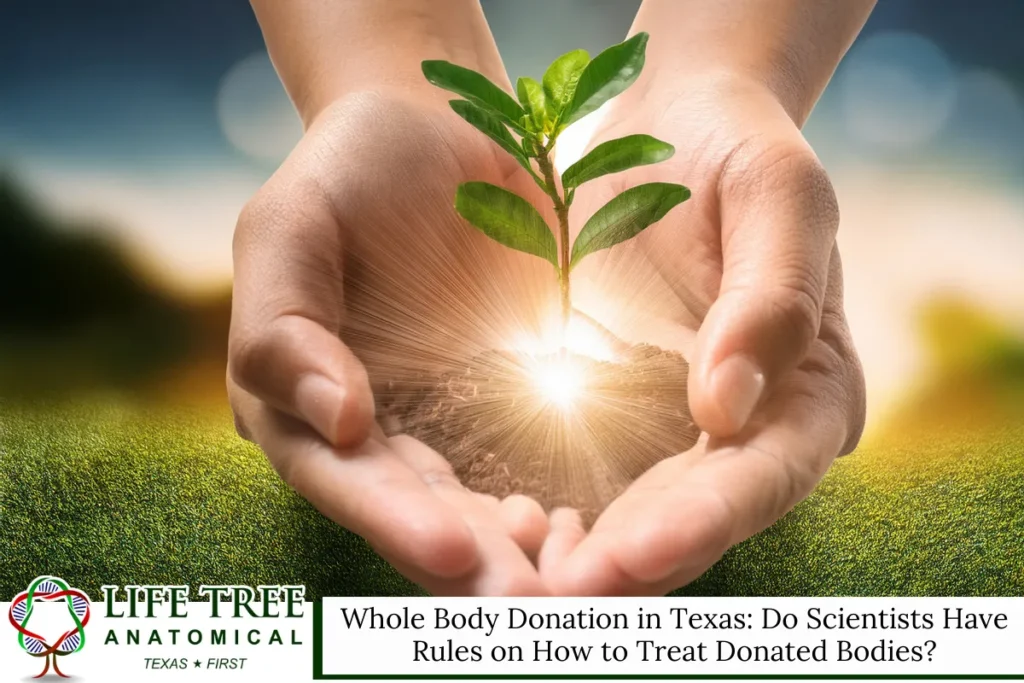Whole-body donation is a profoundly impactful decision that enables individuals to contribute to medical research and education after their passing. In Texas, several programs are available to facilitate this choice, offering individuals an alternative to traditional funeral arrangements. Whole body donation not only aids in the development of future healthcare professionals but also helps advance medical science and treatment for various diseases. This article will examine how whole-body donation works in Texas, the legal aspects surrounding it, and why it is becoming a popular option for those who wish to make a lasting impact on healthcare.
What is Whole Body Donation?
Whole body donation is the act of giving one’s body to science, specifically to medical schools, research institutions, or hospitals. Unlike traditional funeral services, where the deceased is memorialized in a casket or urn, body donation enables the individual to contribute to medical research and education. The body can be utilized in various ways, including anatomy lessons for medical students, surgical training, or research on diseases such as cancer or Alzheimer’s.
This process contributes directly to advancing healthcare. It is important to note that all donations are handled with the utmost care and respect, ensuring that the deceased’s body is treated with dignity throughout the donation process. Donors are not only helping future medical professionals but are also participating in groundbreaking research that could lead to new treatments and life-saving discoveries.
Why Choose Whole Body Donation in Texas?
In Texas, more people are beginning to view whole body donation as a meaningful alternative to traditional funeral services. There are several reasons why someone might choose this path, each with its own compelling benefits.
Contribution to Medical Education
One of the primary reasons individuals choose to donate their bodies is to contribute to medical education and research. Medical schools and institutions rely on whole bodies to train students in anatomy, dissection, and surgical techniques. By providing students with access to real human bodies, they gain hands-on experience that is critical to their learning. These students will go on to become doctors, surgeons, and nurses, profoundly impacting the healthcare system.
Support for Medical Research
Another significant reason for choosing whole body donation is the impact it has on medical research. Researchers use donated bodies to study diseases, develop new treatments, and create innovative medical technologies. In Texas, numerous research institutions benefit from the generous donations of individuals who want to make a difference in the fight against conditions such as cancer, Alzheimer’s, heart disease, and others.
Financial Relief
One of the lesser-known benefits of whole body donation is the financial relief it offers to families. Funeral services in Texas can be expensive, with costs often exceeding $7,000. Whole body donation programs typically cover the transportation of the body, cremation, and the return of ashes (if desired). This can help families avoid the financial burden of traditional funeral expenses during an already difficult time.
A Lasting Legacy
For many, whole body donation represents a way to leave a lasting legacy. It allows individuals to know that, even after they pass away, they will have played a vital role in the education and training of future healthcare professionals. This choice provides a sense of purpose and fulfillment for those who want their lives to continue making a difference long after they’re gone.
The Process of Whole Body Donation in Texas
The process of donating one’s body in Texas is straightforward but involves several key steps that ensure the donor’s wishes are honored.
1. Registration
Most donation programs in Texas require individuals to register in advance. This typically involves completing a donor form and signing a consent agreement. Registration ensures that the individual’s wishes are known before death occurs, providing peace of mind for both the donor and their family.
2. Notification at Time of Death
Upon the donor’s death, the family or healthcare professionals must notify the donation program as soon as possible. It is important to contact the program promptly, as certain conditions or time-sensitive factors may impact whether the body is eligible for donation.
3. Medical Screening
Once notified, the donation program will conduct a medical screening to determine if the body is suitable for donation. Certain medical conditions, such as active infectious diseases or severe trauma, may disqualify a body from donation. This is done to ensure the safety of the students, researchers, and healthcare professionals who will be working with the body.
4. Transportation
Once approved, the body will be transported to the designated medical institution or research facility. In Texas, many donation programs cover the costs of transportation, ensuring that families do not incur additional financial burdens during the donation process.
5. Use of Body in Education and Research
After the body has been received, it will be used for medical education or research. Bodies may be used for anatomical study, surgical training, or research into various medical conditions. These contributions are invaluable to the medical community, helping to train the next generation of healthcare professionals and contribute to groundbreaking research.
6. Cremation and Return of Ashes
Once the educational or research process is complete, the body is cremated, and the ashes are returned to the family, if requested. This allows families to have a tangible connection to their loved one after the donation process is completed.
Legal and Ethical Considerations for Whole Body Donation in Texas
Whole body donation is governed by a series of legal and ethical guidelines to ensure that the process is handled with respect and integrity.
Texas Donation Laws
In Texas, the Revised Uniform Anatomical Gift Act governs the donation of bodies and organs. This law ensures that individuals have the legal right to donate their bodies, either by registering in advance or through their family members after death. Additionally, donation programs are required to operate in compliance with state laws and ethical standards.
Ethical Standards
Strict ethical guidelines bind donation programs in Texas. Donors are treated with dignity and respect, and all donations are used solely for educational and research purposes. The programs must also ensure transparency with families, keeping them informed about how the body will be used and returning the ashes when requested.
Differences Between Whole Body Donation and Traditional Funeral Services
Whole body donation offers an alternative to traditional funeral services. Unlike traditional burial or cremation, whole body donation focuses on medical science and the advancement of healthcare.
Purpose
Traditional funeral services focus on remembering and honoring the deceased, while whole-body donation centers on contributing to medical education and research. Donors may choose to have a memorial service or celebration of life in addition to donating their bodies, combining both options.
Costs
Traditional funeral costs in Texas can be prohibitively expensive, often ranging from $7,000 to $10,000. In contrast, many donation programs cover the transportation and cremation costs, significantly reducing the financial burden on families.
Legacy
While traditional funerals provide families with an opportunity to remember and celebrate their loved one, whole body donation offers a unique legacy. Donors can take comfort in knowing that their bodies are being used to help future generations of healthcare professionals, contributing to medical advancements that could save lives.
How to Plan for Whole Body Donation in Texas
Planning for whole-body donation involves a few simple yet essential steps to ensure that the donor’s wishes are followed.
- Research Donation Programs – Begin by researching the donation programs available in Texas. Look for programs that align with your values and ensure that they are reputable and respectful in their handling of the body.
- Register Early – Complete the necessary registration forms to ensure that your wishes are clearly documented and understood. This step will help avoid confusion at the time of death.
- Inform Your Family – It’s crucial to communicate your decision to your family and ensure they understand your wishes. This will help avoid any confusion or miscommunication when the time comes.
- Keep Documentation Accessible – Store your donor card or registration paperwork in a readily accessible location so that it can be easily retrieved when needed.
- Be Prepared for Possible Alternatives – While most donors are accepted, certain conditions may render the body ineligible for donation. It’s essential to be open to alternative arrangements if the program cannot accommodate your body.
The Growing Importance of Whole Body Donation in Texas
Whole body donation is becoming an increasingly popular choice in Texas, and for good reason. It provides an opportunity to leave a lasting legacy in the fields of medical education and research. The process is straightforward, and the benefits are immense—for both the donor and their family, as well as the medical community.
If you or someone you know is considering whole body donation, it’s essential to research available programs and register early. This will ensure that your wishes are respected and that your contribution can have the most significant impact on the healthcare system. With the help of dedicated donation programs, your legacy can live on through the education of future medical professionals and advancements in medical research.
Texas Whole Body Donation – Life Tree Anatomical
For individuals in Texas considering whole-body donation, Life Tree Anatomical in Austin offers a respected and compassionate program. As the first non-university willed body program in Texas, we provide a unique and direct way for individuals to contribute to medical education and research. The program is committed to ensuring a smooth and respectful donation process, with dedicated support for families every step of the way.
We offer a dignified way to leave a meaningful legacy. By partnering with medical institutions, the program helps train the next generation of healthcare professionals and supports groundbreaking medical research. If you or your loved ones are interested in learning more about whole-body donation, contact us at (512) 402-8533 for more information.
FAQ: Whole Body Donation in Texas
What is whole body donation, and why is it important?
Whole body donation involves giving your body after death to advance medical training and research efforts. Donors contribute their human anatomy to help future health workers and students study anatomical structures, practice surgical techniques, and develop new medical devices. Donating the human body allows for gross anatomy education and clinical training. It also supports medical knowledge through hands-on experience, benefiting both research facilities and medical schools.
By registering as a body donor, individuals can leave a lasting legacy, supporting healthcare education and helping the medical community develop better treatments and therapies. A declaration of consent governs the process and involves completing a donor registration form or obtaining a donor participant card.
How do I register for whole body donation in Texas?
To become a donor, complete a donor registration form through a recognized anatomical donation program. Texas programs allow individuals to register in advance, ensuring that their declaration of consent is legally binding. The medical examiner and death certificate will be involved when the time comes to confirm eligibility for donation.
What happens after the donation?
After death, the body is transported to a research facility or medical school where it’s used for educational purposes. The body may be studied in gross anatomy courses or used in medical training for various specialties. Once the program is completed, cremated remains are typically returned to the family. Donors leave behind a profound impact on healthcare education and contribute to improving medical training for generations.
Are there any restrictions on whole-body donation?
While whole-body donation is an honorable choice, certain factors may disqualify potential donors, such as the presence of specific diseases or medical conditions. Organ donation may also be a factor, as some organs may need to be preserved for transplant, and this can affect donation eligibility. Ensure that you review the requirements outlined by the donation program and consult with a medical examiner if necessary.
Can I have a funeral or memorial service if I donate my body?
Yes, you can still hold a memorial service or create a memorial site for your loved one. Many people opt for a service before donating. Families can honor their loved ones through gatherings, celebrations of life, or memorials, while also contributing to anatomical learning. The ashes of the cremated remains are returned, providing closure for the family.
What is the difference between organ donation and whole body donation?
While both organ donation and whole-body donation are important, they serve distinct purposes. Organ donation focuses on providing individual organs, such as kidneys or hearts, to save lives. In contrast, anatomical donation involves donating the entire body for educational and research purposes, benefiting medical training and healthcare education. Whole body donation contributes to the understanding of human anatomy, supporting the development of new medical practices, tools, and treatments.
Read more: How Medical Students Benefit from Whole Body Donation in Texas




